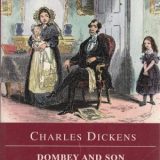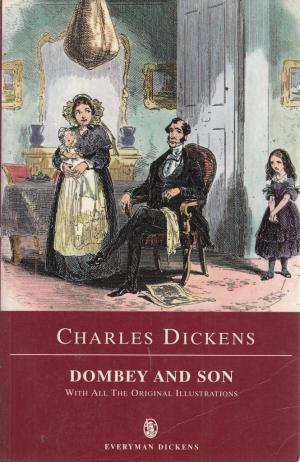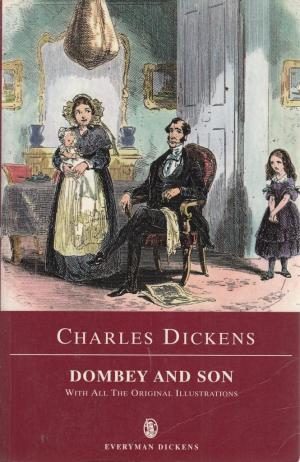Dombey and Son – Charles Dickens – 1846-48
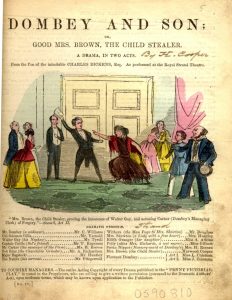
The following is a compilation of discussions from our Talk Literature page (you are more than welcome to participate in active discussions there). To add your own review or remarks, please scroll down to the comment box. — ReadLit Team
Posted by Joffre on 5/7/2016, 22:01:10
I’m going to post as I read. I’m only around a hundred pages in.
So far I have found the book very hard to get into. The other day I was annoyed by the repetition of names. Mrs. Chick, Miss Tox, Mrs. Chick, Miss Tox, Lousia, Paul, Mr. Dombey, blah, blah, blah.
I looked and saw that the book in print is 1028 pages and my heart sank. I had no idea how long it was.
I did, however, read a customer review which interested me. It described Dombey as a very every day sort of villain, not malicious, but cold, unfeeling, and single-minded. I like that.
I enjoyed what I read this morning a little more. It was mostly about Florence’s getting lost and the subsequent dismissal of Richards.
~
Posted by Sterling on 6/7/2016, 9:25:41
Yes. I found Florence’s flight, capture, and rescue, with the subsequent dismissal of Richards, the most memorable incident in the early part of the novel. I’m not sure yet that Dombey is exactly the villain of the piece, but he is certainly a cold and unfeeling man, at least to the saintly Florence (who reminds me a bit of Esther in Bleak House).
~
Posted by joffre on 8/7/2016, 21:39:27
At first, I didn’t know if I would continue with Dombey, but I wanted to give it a chance, and since Florence’s adventure, it has been better if not quite thrilling.
The conversation between Wickham and Nippy or whomever it was about little Paul being nursed by the dead mother was pleasantly eerie, and the eeriness of little Paul in his conversation with his father and later with the school mistress is entertaining.
According to Kindle, I’m 20% through, and I’m enjoying it well enough to go on now.
~
Posted by joffre on 11/7/2016, 11:02:36
Well, little Paul is dead. I am surprised to find the son in Dombey & Son dying less than halfway through the novel. I wonder if all this murmuring sea and river bearing him away isn’t rather cheesy. But I was more interested in him than anything else, so now what?
~
Posted by Sterling on 11/7/2016, 21:27:16
Well, I don’t know. I thought that the first part of Chapter 16 was rather beautifully written (before it got all sentimental with all those good-byes and Jesus shining bright.) Hang in there. In my opinion, the story flounders a bit until Chapter 21, “New Faces.” Then my interest picked up again. BTW, you’ve almost caught up to me. I haven’t had much time to read lately.
~
Posted by Joffre on 20/7/2016, 15:03:45
I’ve crossed the halfway mark. I’m enjoying the story well enough. I agree that the new faces have added much to the story. I am curious to see how the marriage goes on. I say goes on because I am quite sure it won’t work out. The wedding was rather boring.
~
Posted by Sterling on 25/7/2016, 22:05:08
I didn’t find the wedding that boring. I thought there were some really interesting details and character sketches. Now, Captain Cuttle and Uncle Sol are pretty boring to me. I hope Dickens has planned a “pay off” for the time I’ve spent with them!
~
Posted by joffre on 6/8/2016, 21:27:20
Well, I finished. Although, after the first 200 pages, I didn’t dislike the book, I think it does lift David Copperfield off the bottom spot on my Dickens list. I found the apostrophizing of death and the dog and whatever else, rather annoying. I didn’t mind characters apostrophizing, but I did mind the narrator doing so. I also found other authorial comments annoying. I didn’t make not of any but they were such things as, oh, that Dombey could see what love he neglects. I also found passages too sentimental even for Dickens. There were, of course, good things too, though I find it harder to name them. There were scenes and characters I quite enjoyed.
Random comments:
Carker’s death reminded me of the death of Lolita’s mother.
I wondered about the psychology of Florence. These days we’d think she was supposed to become involved with Carker to get daddy’s attention. Or be in a girls gone wild video. Amusing to think of Florence gone wild.
~
Posted by Sterling on 9/8/2016, 8:17:49
For most of the length of this novel, it has been a slog for me. I’m not sure whether Steven-itis is contagious (so that the problem is me) or if Dombey and Son is really just not all that interesting. The novel never really seems to “catch fire.” For me, it was consistently slow, wordy, sometimes unbearably sentimental. I agree with you, Joffre, about the narrator apostrophizing. The natural climax of the novel is Carker’s death, which one would expect to be followed by a marriage or two and a generally happy ending. Alas, there’s something like 100 more pages (which I am in the middle of now). I’ll write more after I’m done.
The only other thing I have to say is that Dombey and Son has caused me to re-think whether I actually want to read all of Dickens’ novels. Life is short.
~
Posted by Sterling on 14/8/2016, 18:03:06
I have to say that I genuinely enjoyed the character of Edith. Dickens definitely surprised me there. She seemed perfectly set up to be a stock “wicked stepmother,” but he went an entirely different direction. Bagstock also struck me as a successful character. It seems to me that many years ago I used to quote, “Tough, sir, tough, and devilish sly” without the slightest idea where it came from. Miss Tox is a successful portrait of a standard Dickensian type. Although much more sane, she reminds me of Miss Flite in Bleak House, as well as several others. There is much to admire in this novel, but it seems that the narrative flags after little Paul’s death. Dickens is, in my opinion, unsuccessful in shifting our attention and affections to the rather colorless Florence. The novel loses its narrative drive. Although Dickens is usually verbose by modern standards, this is the only novel of his that I would have liked to see given a firm editor’s hand.
A couple of questions. I am vague on the connection between Alice and Carker. I mean, I know that he “ruined” her, by Victorian standards, but what was her crime for which she was transported? Did Carker have anything to do with it? Somehow I missed that. I also was a vague on what John Carker’s crime was. He’s still employed, so it must not have been that bad, but what did he do? Why did Harriet sympathize with him? I get that Carker the Manager hated his brother for Harriet choosing John over James, but I don’t feel like I understand that whole subplot. (And doesn’t it seem creepily incestuous for him to be so jealous about their sister?) And finally, does Edith go to Carker only to revenge herself on Dombey? Or rather, does this seem to her to be a way to humiliate both Dombey and Carker, as well as expressing her self-hatred?
Dickens probably provided the answers to these questions, but through the long passages of empty moralizing and such, perhaps I nodded.
~
Posted by guillermo maynez on 15/8/2016, 13:42:12
Certainly, “Dombey and Son” is not the best of Dickens’s novels. Still, as I have said, I have a soft spot for him and enjoy reading him. I agree with you in basically all your opinions regarding this novel: the moralizing parts take steam away from the narrative; Florence is rather colorless (it would have been nice to have seen her confront her father and tell him a thing or two); little Paul’s early death hurts the plot, and so on.
For me also, Edith and Mrs. Skewton are the best characters, along with Carker the Manager. I think the chapter on his flight and death could be an excellent short story by itself. Regarding your questions, here are my attempts at answers:
- Alice and Carker. It seems that Carker seduced her, forced her to committ some kind of robbery or fraud, and then abandoned her to her judicial fate, and so she’s keen on revenge.
- John Carker’s crime seems to have consisted in taking money from the firm (stealing). He was pardoned, but as a punishment he was condemned to the lowest rung of the firm and the constant reminding of his crime amid the general slight of his companions. He would be unable to find other employment, as Dombey had the power to circulate his case around. He’s also a reminder on his brother that the family has been dishonored.
- This, however, does not stop Carker the Manager from also stealing from his employer. He has done some deals on the side, and now he tries to run away with the beautiful Edith, who takes the chance to revenge herself from both men.
Or at least that’s what I understood.
~
Posted by Sterling on 18/8/2016, 22:15:08
Thank you, Guillermo. it’s odd, but the novel seems to be better in my memory as the memorable aspects settle in and the rest slips away. Yes, indeed, Carker’s flight and death are exceptional.
~
Posted by joffre on 19/8/2016, 10:05:10
I don’t think the text of Dombey & Son answers your questions so clearly. I think we’re left to speculate, and Guillermo’s speculation seems about right. I don’t think we can say anything more specific. But I was certainly nodding through much of the book.
I was never really keen on reading all of Dickens. If I read another, it will probably be Our Mutual Friend, which I know you all read here. Have you read A Tale of Two Cities? I’m under the impression that it’s one of Dickens’s worst novels, probably because Fadiman says so in TNLRP, but there do seem to be some dissenting opinions.
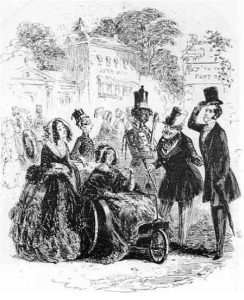
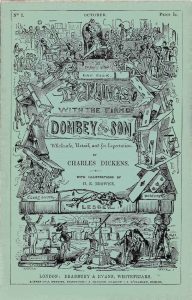
Your comments are very welcome. Please sign in and use the contribute box below to write a review or to add your comments. You may also enjoy our Talk Literature page for active discussions.


